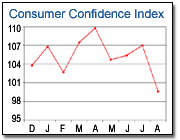

Do you ever feel a disconnect between the images on TV from Iraq and the daily reality of life here in the Valley, of the price of crude and the latest funding announcement, of the energy and optimism of the time with the stories of unfunded pensions and skyrocketing household debt?
With out sounding alarmist, what does the possibility of a real estate/consumer-debt driven recession mean for the sustainability of that disconnect? I recently sat down with a smart hedge fund investor who reeled off a series of disquieting statistics that suggested that the end of a debt-driven asset bubble was nigh.
He argued that consumer spending is the engine driving America's economic engine and that the engine is beginning to sputter. For example, economists believe that consumer spending accounts for two-thirds of current economic growth. The market hangs on the monthly consumer confidence index as a predictor of future economic activity.
The VC industry is also banking on the consumer with Internet, device, and semiconductor investment theses predicated on robust consumer spending activity. In my four years in the VC business, I watched the industry move completely away and then back towards the consumer. The question this post addresses is what are the implications of early warning signs of a slowdown in consumer spending activity, a fall in housing prices, and a growing crisis in consumer confidence? Also, if a slowdown does happen, it may pay to ask if the technology in one's portfolio is pro versus counter cyclical.
Market experts are beginning to question the sustainability of economic growth dependent on a consumer facing record high gas prices, household debt, and rising interest rates. The CCI fell from 107 to 99.6 from July to August, or by 7%. The market is beginning to punish companies exposed to consumer confidence and spending ability - Toll Brothers, a home builder, is down 46% from its 52 week high, Downey Financial, a mortgage lender, is down 15%, and Tiffany and Co is down 28%.
What is driving the stock market's concern about consumer-facing businesses. In a nutshell...consumer fatigue.
- From 2001-2004 median household debt grew 34%
- the household debt service ratio hit a record high in Q106 of 18% (ie. $18 of every $100 after-tax dollars goes to service debt), up 15% from Q199
- In 2005, real disposable incomes of private households in the United States increased $93.8 billion, or 1.2%, while their debts grew $1,208.6 billion, or 11.7%.
- Total consumer spending on goods, services and new housing accounted for 92% of real GDP growth
- average household debt grew to $90,000
- a large portion of consumer debt is set to reset in the coming few years
- 22% of the $8.7 trillion US mortgages are ARM based, with 40% of all new mortgages in 2005 being ARM based
- home sales are falling, inventories are rising, and prices are falling below appraised value
The truth of the matter is that I am not at all sure how to think about the data above. It seems clear that a cyclical shift in the economy is underway with consumer spending no longer a dependable engine of economic growth. Counter-cyclical stocks, Costco and WMT, will probably benefit from a shift in spending away from high-end stores.
Similarly, in IT and on the web it is conceivable that technologies that drive efficiency, reduce costs, and deliver WMT-type benefits to consumers (be they enterprise or consumer) will do well. Companies that target discretionary spending (ie vacation travel, consumer electronics, consumer finance) will most likely suffer.
On the web, we all are benefiting from an allocation of spend from offline to online. Will a recession accelerate that allocation - ie even if the total pie of dollars shrinks, will the hard ROI of internet marketing lead to an increase in absolute dollars spent on-line?
Will a recession accelerate the adoption of open source IT solutions, lower TCO and deployment technologies such as SaaS, and virtualization technologies that increase asset utilization?
Ie, will the recent sector bets of our industry, largely shaped by the last downturn in spending, prove to be prescient and counter-cyclical in that economic distress increases the value proposition of solutions that drive out excess margin and increase productivity?
Or will a slowdown not only reduce the total pie of available dollars but also retrench spending towards incumbent vendors and established business processes (think more not less of newspaper advertising and IBM).
If VC returns and start-up prospects are truly uncorrelated to the equity markets then these questions may be moot? However, if our companies and our exits are a function of the health of the US economy then it is worth thinking how prospective investments as well as portfolio companies will fare if the consumer spigot shuts down and the 2/3 engine of our economy feels the pinch of debt loads that crowd out discretionary spending.
To use two public examples...my personal opinion is that GOOG and VMWare (proxies for start-up related activity) will prove to be counter-cyclical. GOOG delivers auditable value and makes marketing a more scientific lever to create value and ROI. VMWare delivers more flexible IT environments, whereby utilization rises, cap ex is reduced, op ex is reduced, and return on assets goes up.
Despite the ominous storm clouds on the horizon, I believe that the best lessons of the last downturn were to focus on companies that deliver value for lower costs.
It will be interesting to watch how counter-cyclical these technologies prove to be and if an economic slowdown accelerates the rate of deployment and allocation of dollars. If we are wrong, it may be a rough couple of years.
You are right about the short-term direction of the consumer; however, I think Fed/Treasury will inflate US out of a slowdown. Don't forget who else has a heavy debt load--we get to pay back the federal deficit with cheaper dollars that way.
ReplyDelete